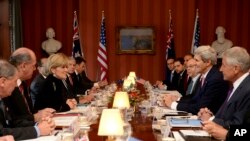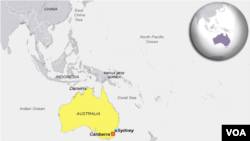Top U.S. and Australian officials have signed a deal that expands American air and naval presence in northern Australia.
The agreement was inked Tuesday during a visit to Sydney by U.S. Secretary of State John Kerry and Pentagon Chief Chuck Hagel, the finalization of a 2011 deal seen as a key part of the U.S. rebalance to Asia. The deal will put 2,500 Marines in Darwin by 2017.
Kerry said the agreement will help Australia and the U.S. deal with regional security issues of mutual importance.
"We do face new challenges. The South China Sea questions, the uncertainties in the Japan Sea and elsewhere, North Korea, and of course foreign fighters who go to various parts of the world and learn jihadism and come back with bad intentions. So there's a lot for us to work on together," said Kerry.
Kerry and Hagel later discussed a wide range of security issues with their Australian counterparts, Foreign Minister Julie Bishop and Defense Minister David Johnston.
The U.S. and Australian leaders sought to allay concerns that their countries' closer military relationship is aimed at containing China's rise, as Beijing claims.
Kerry said the U.S. does not want "conflict and confrontation" with China, but hopes Beijing can become a "cooperative partner" on the global stage.
Earlier Tuesday, Bishop told the Australian Broadcasting Corporation that both countries are only trying to support the "long-term peace, stability and prosperity of our region."
Ahead of the Tuesday talks, Hagel insisted Washington is firmly committed to the Asia rebalance, saying the U.S. is a "Pacific power" that is "not going anywhere."
The U.S. and many of its Asian allies are concerned that China is acting aggressively towards the neighbors with which it has territorial disputes.
At an ASEAN meeting that wrapped up earlier this week in Myanmar, also known as Burma, Kerry pushed unsuccessfully for parties in the disputes to agree to refrain from provocative actions.
China's foreign ministry responded to the proposal by accusing Washington of stoking tensions in the region.
A State Department spokesman said Monday that Washington will monitor the disputed South China Sea to assess whether de-escalatory steps are being taken.
The United States has accused China of asserting itself militarily in territorial disputes with Brunei, Malaysia, Vietnam, and the Philippines in the South China Sea, and competing claims with Japan over a group of uninhabited islands northeast of Taiwan.






